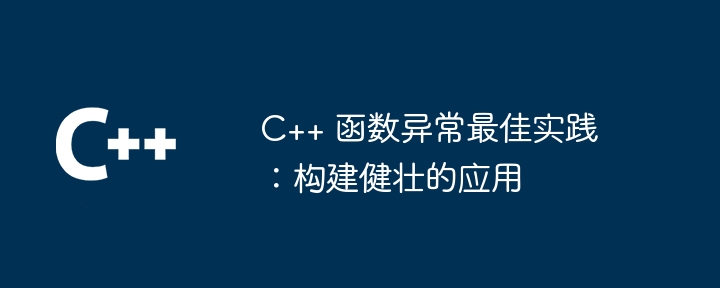
C function exception handling best practices include: defining well-defined hierarchical exceptions, using exception specifications to force compile-time error handling, handling exceptions appropriately through try-catch blocks, avoiding duplicate exception handling, following RAII principles, and not masking exceptions , thereby ensuring the robustness of the application.

Exception handling is an integral part of modern C because it allows you to Handle error conditions during calls, making your code more robust and maintainable. In this article, we will explore the best practices for exception handling in C functions and demonstrate their use through a practical case.
When defining exceptions, make sure they are:
Exception specifications are a mechanism for informing the compiler of the types of exceptions that a function may throw. This allows the compiler to force error handling at compile time. To use exception specifications, use thenoexceptorthrowkeyword in the function declaration.
// 不抛出异常的函数 int divide(int a, int b) noexcept { ... } // 抛出 std::invalid_argument 的函数 int parse_int(const std::string& str) throw(std::invalid_argument);
When a function throws an exception, it is the caller's responsibility to handle it. You can usetry-catchblocks to catch exceptions and take appropriate action.
try { int result = divide(10, 2); // 使用已捕获的异常值 } catch (const std::invalid_argument& e) { std::cerr << "无效的参数:" << e.what() << std::endl; }
Let us consider an example of a functionparse_intthat parses a string into an integer. If the string is not a valid integer, the function will throw astd::invalid_argumentexception.
#include#include int parse_int(const std::string& str) throw(std::invalid_argument) { // 检查字符串是否为空 if (str.empty()) { throw std::invalid_argument("空字符串"); } // 遍历字符串并检查字符是否有效 for (char c : str) { if (!isdigit(c)) { throw std::invalid_argument("无效的字符:" + std::string{c}); } } // 将字符串转换为整数 return std::stoi(str); } int main() { try { int result = parse_int("123"); std::cout << "解析结果:" << result << std::endl; } catch (const std::invalid_argument& e) { std::cerr << "错误:" << e.what() << std::endl; } return 0; }
When multiple function calls may throw the same exception type, usingtry-catchblocks to surround multiple function calls can be avoided redundancy.
try { int result1 = parse_int("123"); int result2 = parse_int("456"); // 处理任何已捕获的 std::invalid_argument 异常 } catch (const std::invalid_argument& e) { ... }
Following the Resource Acquisition Is Initialization (RAII) principle helps ensure that resources are released correctly in the event of an exception. By using smart pointers or exception-safe containers, you can ensure that resources are automatically released when an exception occurs.
#includevoid do_something() { // 使用智能指针管理资源 std::unique_ptr resource = ...; try { // 使用资源执行操作 } catch (...) { // 异常发生时,resource 将自动释放 } }
When handling exceptions, it is important not to mask them by rethrowing or ignoring them in acatchblock. This can make debugging and error handling more difficult. Instead, exceptions should always be logged or logged, and errors appropriately communicated to the user.
By adopting these best practices, you can build robust and maintainable C applications that handle exceptions efficiently and provide user-friendly error messages.
The above is the detailed content of C++ Function Exceptions Best Practices: Building Robust Applications. For more information, please follow other related articles on the PHP Chinese website!
 Build your own git server
Build your own git server The difference between git and svn
The difference between git and svn git undo submitted commit
git undo submitted commit What are the differences between c++ and c language
What are the differences between c++ and c language Recommended learning order for c++ and python
Recommended learning order for c++ and python Cost-effectiveness analysis of learning python and c++
Cost-effectiveness analysis of learning python and c++ Is c language the same as c++?
Is c language the same as c++? Which is better to learn first, c language or c++?
Which is better to learn first, c language or c++?



